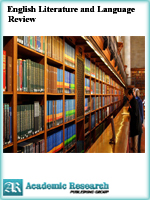English Literature and Language Review
Online ISSN: 2412-1703
Print ISSN: 2413-8827
Print ISSN: 2413-8827
Quarterly Published (4 Issues Per Year)

Archives
Volume 1 Number 2 May 2015
A Survey of Human Wickedness in Shakespeares Macbeth
Authors: Hassan Abedi Firouzjaee
Pages: 17-22
Abstract
The present article investigates the reasons of general human behaviors accompanied by their nature and characteristics in Shakespeare’s great tragedy, Macbeth. Shakespeare with a mixture of tragic and comic tones tested everybody with the scale of humanism (humanity) in this play. He poses the story of the struggle of the human spirit out of darkness of errors and sin, into the light of truth and wisdom. He uses Macbeth to show that dark thought and unconscious temptations cause a man who lacks strength of character to do terrible actions. Through various soliloquies of Macbeth and Lady Macbeth, Shakespeare transforms them into a reflective analysis of human characteristics and identifies the complexity of the human condition. This play is a deep interpretation of realistic view of psychological, social, and divines human personality in the process of life affairs and the interactions among people with their destinies.
Pragmatic Functions of Interpreters? Own Discourse Markers in Simultaneous Interpreting: A Case Study of the 2012 Chinese Spring Festival Gala
Authors: Chuanmao Tian
Pages: 5-16
Abstract
Taking authentic data from the simultaneous interpreting of the Chinese 2012 Spring Festival Gala as the corpus of this study, the present paper summarizes two kinds of pragmatic functions with regard to the discourse markers used in the corpus, namely passive markers and proactive markers. The discourse markers discussed here are used by the interpreters, not those they translated. The paper then discusses their functions with some examples. Finally, the reasons for using discourse markers are investigated. It is hoped that the research findings can shed some light on the success of simultaneous interpreters in use of discourse markers.



